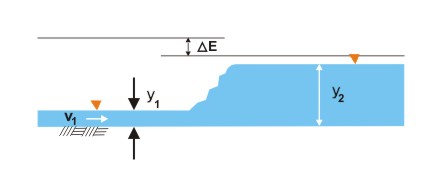Lab 04: The Hydraulic Jump
[RDA] Good morning
...
[RDA] Today we are going to demonstrate
the hydraulic jump.
...
[RDA]
The hydraulic jump is an open-channel flow phenomenon by which the flow
passes suddenly from supercritical upstream of the jump, to subcritical downstream.
....
[RDA]
The hydraulic jump is formed in a horizontal channel when the headwater condition is sufficiently low and the
tailwater condition is sufficiently high.
...
[RDA]
The hydraulic jump always occurs with a loss of energy.
...
[RDA]
The formula for the energy loss is:
...
[RDA]
We turn on the pump.
....
[RDA]
We set the bed slope equal to zero and check the level [Point to the level].
...
[RDA]
The hydraulic jump is established. [Wait to the jump to form]
...
[RDA] [Point to the gage]
Note that the point gage is at zero.
...
[RDA]
Now we are going to measure the height ot the bottom of the flume.
...
[RDA]
The height is X mm.
...
[RDA]
Now we are going to measure the height to the upstream water surface.
...
[RDA]
The height is Y mm.
...
[RDA]
The upstream depth is: y1 = X - Y
...
[RDA]
Now we are going to measure the height to the downstream water surface.
...
[RDA]
The height is Z mm.
...
[RDA]
The downstream depth is: y2 = X - Z
[RDA]
The energy loss due to the jump is:
...
[RDA] Thank you.
ΔE = (y2 - y1)3 / (4 y1 y2)
ΔE = (y2 - y1)3 / (4 y1 y2)
